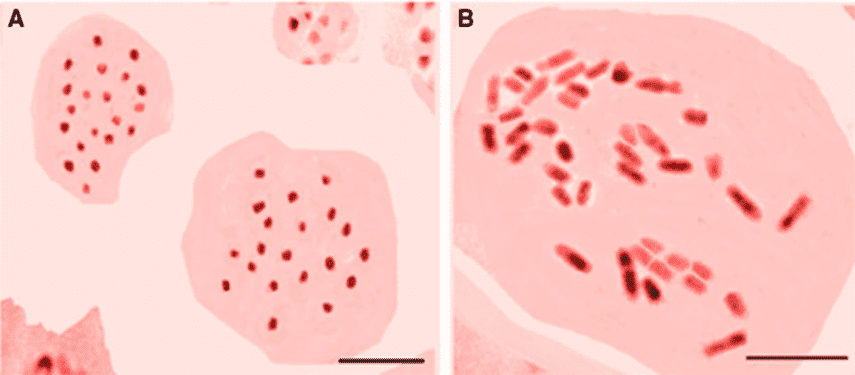
Impact of Pretreatment Methods on Chromosome Stability in Regenerated Plantlets
Title
Impact of Pretreatment Methods on Chromosome Stability in Regenerated Plantlets
Author
1. Samiya Khan, Student, University of Greenwich, India
Abstract
The root tips of various in vitro-cultivated young plants,
encompassing Anogeissus species, Capparis decidua, and Maytenus emarginata,
underwent treatment with colchicine and exposure to cold temperatures at -4°C
overnight. Following these preliminary treatments, the plant's root tips were
preserved using a combination of glacial sulfuric acid and absolute ethanol in
a 1:3 proportion. After fixation, the root tips were stained with a 0.5%
solution of basic fuchsine in preparation for chromosome analysis, involving
the creation of squash preparations. These dyed root tips were gently pressed
in a 1% acetocarmine solution with zinc chloride as a mordant. Subsequently,
the produced slides were scrutinized under a microscope. The results revealed
that most in vitro-cultivated plantlets exhibited chromosomal stability, while
a minority of the seedlings displayed aneuploidy.
Keywords
Conclusion
The impact of several pretreatment procedures on the
stability of chromosomes in regenerated plantlets of Anogeissus acuminata,
Capparis decidua, and Maytenus emarginata was investigated in this work. The
findings demonstrated that most plantlets produced in vitro had stable
chromosomal counts, notably in the case of Anogeissus acuminata, which
exhibited excellent stability throughout several passes. Additionally, Capparis
decidua demonstrated a constant chromosome count, contradicting earlier
volatility results, with very few aneuploid cells. The appropriate diploid
genome count of Maytenus emarginata was verified despite obstacles in the
cytological investigation of the regenerants. This work demonstrates how
crucial cytological studies are to secure the stability and genetic integrity
of regenerants in tissue culture.
Author Contrubution
The author confirms sole responsibility for the following: study conception and design, data collection, analysis and interpretation of results, and manuscript preparation.
Funding
The authors did not receive any specific grants from funding agencies in the public, commercial, or non-profit sectors for the research, authorship, and/or publication of this article.
Conflict of Interest
All authors declare that they have no conflicts of interest.
Data Sharing Statement
Software And Tools Use
Not applicable
Acknowledgements
I thank the following individuals for their expertise and assistance in all aspects of our study and for their help in writing the manuscript. I am also grateful for the insightful comments given by anonymous peer reviewers. Everyone's generosity and expertise have improved this study in myriad ways and saved me from many errors.
Corresponding Author
Samiya Khan
University of Greenwich, Student, India
Copyright
Copyright: ©2026 Corresponding Author. This is an open access article distributed under the terms of the Creative Commons Attribution License , which permits unrestricted use, distribution, and reproduction in any medium, provided the original author and source are credited.
Khan, Samiya. “Impact of Pretreatment Methods on Chromosome Stability in Regenerated Plantlets.” Scientific Research Journal of Biology and Life Science, vol. 1, no. 2, 2023, pp. 13-15, https://isrdo.org/journal/SRJBL/currentissue/impact-of-pretreatment-methods-on-chromosome-stability-in-regenerated-plantlets
Khan, S. (2023). Impact of Pretreatment Methods on Chromosome Stability in Regenerated Plantlets. Scientific Research Journal of Biology and Life Science, 1(2), 13-15. https://isrdo.org/journal/SRJBL/currentissue/impact-of-pretreatment-methods-on-chromosome-stability-in-regenerated-plantlets
Khan Samiya, Impact of Pretreatment Methods on Chromosome Stability in Regenerated Plantlets, Scientific Research Journal of Biology and Life Science 1, no. 2(2023): 13-15, https://isrdo.org/journal/SRJBL/currentissue/impact-of-pretreatment-methods-on-chromosome-stability-in-regenerated-plantlets
1148
Total words567
Unique Words54
Sentence20.462962962963
Avg Sentence Length0.34302398989899
Subjectivity0.072226898615788
PolarityText Statistics
Viewed / Downloads
Total article views: 145 (including HTML, PDF, and XML)| HTML | XML | Total | |
|---|---|---|---|
| 100 | 21 | 24 | 145 |
Viewed (geographical distribution)
Thereof 145 with geography defined and 0 with unknown origin.